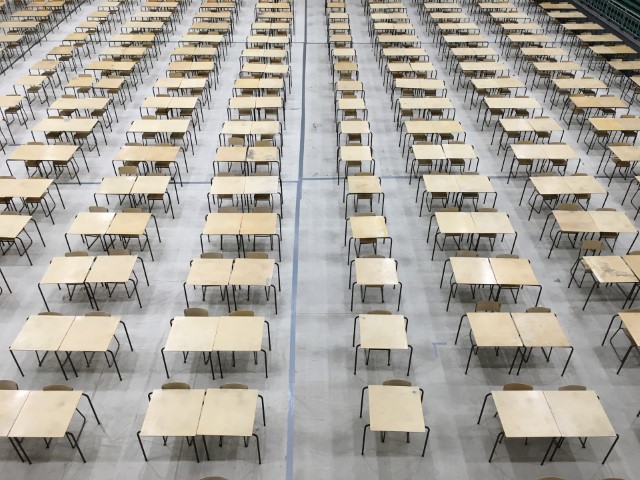Not taking exams is the biggest test of all
January 24 2021

As little as a year ago, it would’ve been inconceivable that GCSE and A-Level examinations could be cancelled following months of school and college closures. Even less imaginable is that they would go on to be cancelled TWO years running, throwing chaos into an already pressurised education system and creating uncertainty, stress and confusion for millions of young people.

empty exam hall
But that is exactly where we are. Despite multiple reassurances from Government that exams would go ahead as planned in 2021, it wasn’t to be, and the headlines appeared, announcing that they had been ‘scrapped’ once more.
The class of 2021 aren’t the only young people affected by this decision, albeit an inevitable one. We already have the students of 2020 for whom this is an already well-trodden path, and thinking ahead, the upcoming 2022 cohort. Taking exams is arguably a rite of passage; even if they go spectacularly awry, the exam process defines the end of school or college and the start of whatever the next thing may be. The challenges these young people may now be facing – through absolutely no fault of their own - are not to be underestimated.
Class of 2020
Pandemic hits.
Schools and colleges close.
Exams are cancelled.
Government announces grades will be awarded by an algorithm.
Algorithm fails.
Teacher/predicted grades are issued.
Students are sent off to college or university.
Colleges and universities closed after one term.

No-one will ever know what grades would have actually been attained had the exams gone ahead when they were supposed to, with no interruptions in teaching, and that in itself is problematic. How many young people now question whether they ‘deserve’ their place at college or university?
Imposter syndrome is real, and surprisingly common. At some point or another we all doubt our abilities, question whether we are suitable qualified, skilled or capable of a given task or situation. It’s usually possibly to rationalise away those thoughts based on concrete evidence of achievements, qualifications and experiences. How does that now work for the first year medical student who didn’t sit the exams to demonstrate their right to embark on a career as a doctor? Or the law student – a profession steeped in evidence – who has had to take the word of someone else that they’re capable of qualifying?
This isn’t to throw cold water over teacher grades, far from it: there’s every reason to believe they are as close to accurate as accurate can be, but after the trauma of everything that had to happen for them to be given, students may feel they’ve been cheated of having their moment to shine in the exam hall.
Class of 2021
Pandemic continues.
Schools and colleges close, again.
Exams are cancelled.
Government announces grades will be awarded by teacher assessments.
Government then floats the idea of external exams.
Now we wait.
Some young people will be feeling huge relief. Some will feel disappointment. Some will be angry. Some – probably most – will be feeling anxious about what on earth happens next, given the events of their predecessors. How they feel now, in the immediate aftermath of the announcement, won’t necessarily be how they continue to feel next week, next month, or in May when exams were due to begin. The sheer enormity of emotion is huge, and for some young people this will be their first real adversity, while for others it may be the last in a long line of difficulties and struggles, and many may find it difficult to cope. At the present time, those students are not in school or college, the usual in-person systems for identifying those in need of support temporarily suspended, and the reality is that demand may far exceed resources. It’s critical parents and education staff know how to support students, without inadvertently being dismissive or minimising how unsettling the situation i
At the time of writing, just four months before exams were due to start, there is no clarity about what exactly will be happening, to what extent assessments will be carried out or what weighting teacher grades will have on overall outcomes. And this, for young people who have already missed a whole term of face-to-face teaching in 2020, will be a huge burden.

Class of 2022
It’s the year 2022, and we all desperately hope the pandemic was left behind in the first half of 2021, but we won’t know until we get there. But what of the students now treading the uncertain path to exams? To use a massively overused word, it was unprecedented for exams to be cancelled once – an event right up there with postponement of the Olympics. Had exams gone ahead as planned in 2021 there may not have been as huge cause for concern for the 2022 cohort; normal service resumed; all is well.
But as it is, we now have millions of young people, again, thrown into uncertainty. There is every possibility that 2022 will pan out much better than 2021… but didn’t we say that about 2021 in the dark days of 2020? The reality is, we don’t know. And this group of students have now gone through a second school/college closure, and quite frankly have every reason to be nervous. Even if they go ahead and we’re worrying unnecessarily, who’s to say that two years of teacher assessments won’t change how grades are awarded in the future? Will expectations be higher for the first exam students and the standardisation of grades be tighter? Will the months of missed in-person teaching put them at a disadvantage compared to those who were teacher-assessed, who were judged according to what might’ve been?

We just don’t know, but how we help schools, colleges, parents and students to navigate the uncertain times that lie before us is the most challenging test of all. Hope for the students already affected and those still to come is not lost. There ARE things we can do; steps we can take; safeguards we can put in place. In the midst of what feels like chaos and confusion, now is the time to stand up and be a voice of both hope and comfort. COVID will pass, and so will our students.
Practical tips on dealing with cancelled exams
Related
Popular
Upcoming event

Join us for the Bath Half Marathon to support young people and their mental health!

The Charlie Waller Trust
The Charlie Waller Trust is a registered charity in England and Wales 1109984. A company limited by guarantee. Registered company in England and Wales 5447902. Registered address: The Charlie Waller Trust, First Floor, 23 Kingfisher Court, Newbury, Berkshire, RG14 5SJ.
Copyright © 2025 The Charlie Waller Trust. All rights reserved.






